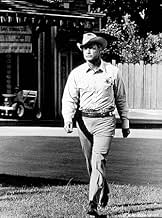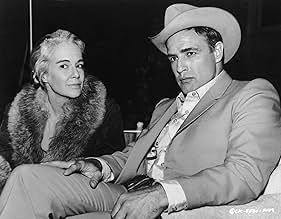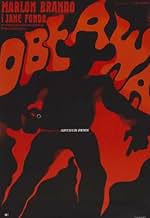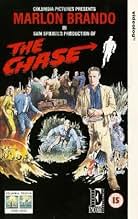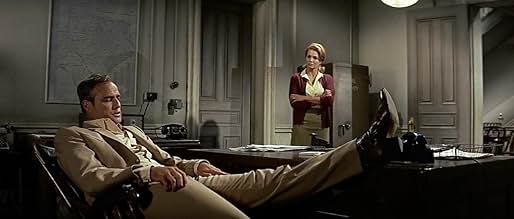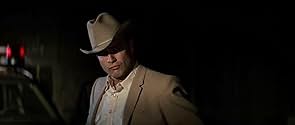The citizens of a small Texas town become worried and panicked when a local bad boy escapes prison and heads for his hometown.The citizens of a small Texas town become worried and panicked when a local bad boy escapes prison and heads for his hometown.The citizens of a small Texas town become worried and panicked when a local bad boy escapes prison and heads for his hometown.
- Awards
- 1 win total
Marc Seaton
- Paul
- (as Marc Skaton)
Featured reviews
"The Chase" is a powerful and underrated drama. It has most of the ingredients that are required for a solid dramatic picture: exceptional acting (particularly by Brando), careful directing, well-drawn characters and good production values. The first half meanders a little, but in the second half the tension mounts and the film becomes constantly more and more involving and moving. So why does it have such a low reputation? Maybe because of all those reported production problems. But who cares? They're certainly not evident in the film! Recommended for mature viewers.
The lukewarm reviews and comments led me to expect less than what I found in this decent movie of small-town corruption. Most of it is probably due to a pretty good cast - Brando is excellent, and Duvall, Dickinson, and E.G.Marshall put in good work. Redford's part is too small to do much with. I too was astounded at James Fox's pretty darn good Southern accent; it was so good that at first I couldn't place him, and then all those British roles came back to me in surprise. The script is ok too, and one would like to know more about the backstage fighting that went on over it between Hellman & company. The Panavision color is excellent; far better than what we have today. The portrayal of small-town bigotry, duplicity, jealousy, betrayal, and infidelity is well-done, and the spectacular junkyard Gotterdamerung is a chilling finale. The flick is definitely worth seeing.
The Chase (1966)
I give this movie extra credit for ambition, and for richness of story and complexity. It's a torrid soap opera overall, which is a good thing because it is saved by its romanticized excesses. The title is odd, in a way, because the obvious "chase" here is the pursuit of the convict on the run (played by Robert Redford, and not his best performance). But in a way there are all kinds of other chases here—women and men wanting each other with a whole network of adultery and would-be affairs at play.
But never quite shown. This is a movie pushing the end of the censorship code, but the code is still officially in place and so there are still some boundaries, even for a director like Arthur Penn, who would help New Hollywood blossom (notably with "Bonnie and Clyde" the next year). But the steamy background as this small town wrestles with decency, among other things, is great stuff.
Decency, as a core idea, is what the main character is all about—the sheriff played by Marlon Brando. Brando is great. He isn't quite the Texas sheriff intended, of course (he's "Brando"), but he has nuance and strength, and he helps his scenes a lot. But the movie is brimming with talent: Robert Duvall, for one. Two women do their parts—Jane Fonda and Angie Dickinson—though neither is given enough to do besides support their male counterparts (Fonda is a kind of "loose woman" and Dickinson is a girlfriend having affairs).
But Penn is the biggest talent, pulling together a very complicated story in two hours. Photographer Joseph LaShelle is great, too, one of the masters of early widescreen color in the US. Together they make this movie fluid, beautiful, and constantly demanding in the best way.
What holds it back is a little of the superficiality that is so common in early 60s films—it's about sensation and effect, about drama for its own sake. You never quite care about Redford in his run (he's a surprisingly small part of the movie until the end). And even all the other characters working out their prejudices are a bit on the surface.
There is a welcome racial theme here, and a generational one (young people utterly selfish and party hungry in this version, and older folk filled with prejudice and greed). I say see this film. There's a lot going on, and I could watch it a second time just for everything I missed.
I give this movie extra credit for ambition, and for richness of story and complexity. It's a torrid soap opera overall, which is a good thing because it is saved by its romanticized excesses. The title is odd, in a way, because the obvious "chase" here is the pursuit of the convict on the run (played by Robert Redford, and not his best performance). But in a way there are all kinds of other chases here—women and men wanting each other with a whole network of adultery and would-be affairs at play.
But never quite shown. This is a movie pushing the end of the censorship code, but the code is still officially in place and so there are still some boundaries, even for a director like Arthur Penn, who would help New Hollywood blossom (notably with "Bonnie and Clyde" the next year). But the steamy background as this small town wrestles with decency, among other things, is great stuff.
Decency, as a core idea, is what the main character is all about—the sheriff played by Marlon Brando. Brando is great. He isn't quite the Texas sheriff intended, of course (he's "Brando"), but he has nuance and strength, and he helps his scenes a lot. But the movie is brimming with talent: Robert Duvall, for one. Two women do their parts—Jane Fonda and Angie Dickinson—though neither is given enough to do besides support their male counterparts (Fonda is a kind of "loose woman" and Dickinson is a girlfriend having affairs).
But Penn is the biggest talent, pulling together a very complicated story in two hours. Photographer Joseph LaShelle is great, too, one of the masters of early widescreen color in the US. Together they make this movie fluid, beautiful, and constantly demanding in the best way.
What holds it back is a little of the superficiality that is so common in early 60s films—it's about sensation and effect, about drama for its own sake. You never quite care about Redford in his run (he's a surprisingly small part of the movie until the end). And even all the other characters working out their prejudices are a bit on the surface.
There is a welcome racial theme here, and a generational one (young people utterly selfish and party hungry in this version, and older folk filled with prejudice and greed). I say see this film. There's a lot going on, and I could watch it a second time just for everything I missed.
At the time of its initial release, few of us knew of the behind-the-scenes problems that beset director, Arthur Penn as he directed "The Chase". I, and many others attended the show and, in 1966, its impact was really astounding. What some critics and viewers take as a rather slow, meandering opening section of the film, I found to be an engrossing study of life in a small Southern town, somewhat low-key and slow-paced, but with a slowly emerging sense of its underlying tensions and conflicts. The news that a local boy has escaped from prison and is headed back to town, serves as the catalyst that eventually brings everything to a boil. Issues such as racism, class conflict, and the effects of evil gossip, come into play as a host of characters find themselves drawn into an ugly crescendo of hatred and fear. The manner in which it all ultimately explodes into a succession of violent scenes left me, and many others I knew, utterly blown away. The shock value and the way it caused us to ponder the meaning of it all long afterward can not be understated. See it now and various elements that reflect common shortcomings in the way big Hollywood productions of the era dealt with such material are far more obvious than they were then. Some dialog doesn't ring true, some of the larger-scale scenes seem overproduced. All the same, it remains a remarkable film, amazingly well acted.
The Chase did get pretty awful reviews when it was released but this is a movie to seek out, if for nothing else the performances. A young Richard Bradford is extremely believable as the town bully and womanizer. Robert Duvall as a henpecked husband. Jane Fonda and Robert Redford in early roles. The real reason to catch this one, however, is Brando's performance, which (as noted by another reviewer) is one of his better ones. I saw this movie when it was released and left the theater feeling exhaustion as well as an inner turmoil because the movie made me so mad! The fight scene at the sheriff's office was pretty violent for it's time and was quite upsetting. Great acting all around. Check it out.
Did you know
- TriviaMarlon Brando did not like the part of Sheriff Calder and complained that all he did in the picture was wander around. He began referring to himself as "The Old Lamplighter".
- GoofsEvery locomotive seen in railroad scenes is diesel powered, but all sounds are from steam locomotive whistles. Diesels use horns, not whistles.
- Quotes
Damon: Well now, Sheriff, it's nice to know that you're out here on patrol.
Sheriff Calder: No, no, I'm not on patrol. Just lookin' for an ice cream cone, that's all.
- ConnectionsEdited into The Old Man & the Gun (2018)
- SoundtracksOne Day Soon
- How long is The Chase?Powered by Alexa
Details
Box office
- Gross US & Canada
- $5,000,000
- Runtime
- 2h 14m(134 min)
- Color
- Aspect ratio
- 2.35 : 1
Contribute to this page
Suggest an edit or add missing content


